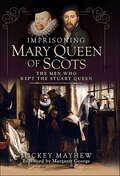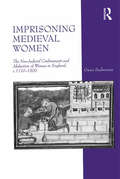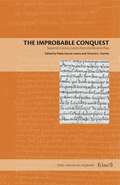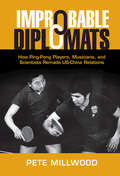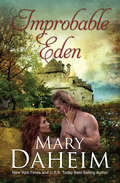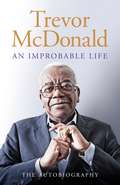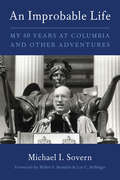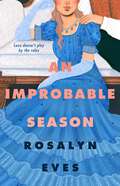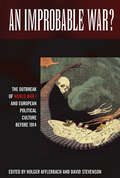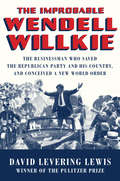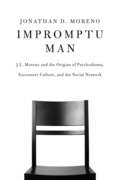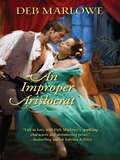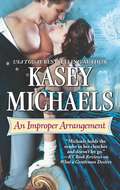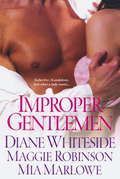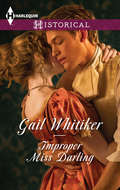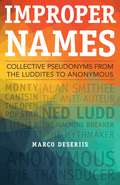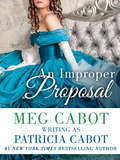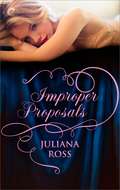- Table View
- List View
Imprisoning Mary Queen of Scots: The Men Who Kept the Stuart Queen
by Mickey MayhewImprisoning Mary Queen of Scots covers the lives and careers of the men and women who ‘kept’ Mary Queen of Scots when she was a political prisoner in England, circa 1568/9-1587. Mary’s troubled claim to the English throne - much to the consternation of her ‘dear cousin’ Elizabeth I - made her a mortal enemy of the aforementioned Virgin Queen and set them on a collision course from which only one would walk away. Mary’s calamitous personal life, encompassing assassinations, kidnaps and abdications, sent her careering into England and right into the lap of Henry VIII’s shrewd but insecure daughter. Having no choice but keep Mary under lock and key, Elizabeth trusted this onerous task to some of the most capable - not to mention the richest - men and women in England; Sir Francis Knollys, Rafe Sadler (of Wolf Hall fame), the Earl of Shrewsbury and his wife, Bess of Hardwick, and finally, the puritanical nit-picker Sir Amyas Paulet. Until now, these nobles have been mere bit-players in Mary’s story; now, their own lives, loves and fortunes are laid bare for all to see. From Carlisle Castle to Fotheringay, these men and women all but bankrupted themselves in keeping the deposed Scots queen in the style to which she was accustomed, while fending off countless escape plots of which Mary herself was often the author. With the sort of twist that history excels at, it was in fact a honeytrap escape plot set up by Elizabeth’s ministers that finally saw Mary brought to the executioner’s block, but what of the lives of the gaolers who had until then acted as her guardian? This book explains how Shrewsbury and Bess saw their marriage wrecked by Mary’s legendary charms, and how Sir Amyas Paulet ended up making a guest appearance on ‘Most Haunted’, some several hundred years after his death. In that theme, the book also covers the appearances of these men and women on film and TV, in novels and also the various other Mary-related media that help keep simmering the legend of this most misunderstood of monarchs.
Imprisoning Medieval Women: The Non-Judicial Confinement and Abduction of Women in England, c.1170-1509
by Gwen SeabourneThe non-judicial confinement of women is a common event in medieval European literature and hagiography. The literary image of the imprisoned woman, usually a noblewoman, has carried through into the quasi-medieval world of the fairy and folk tale, in which the 'maiden in the tower' is one of the archetypes. Yet the confinement of women outside of the judicial system was not simply a fiction in the medieval period. Men too were imprisoned without trial and sometimes on mere suspicion of an offence, yet evidence suggests that there were important differences in the circumstances under which men and women were incarcerated, and in their roles in relation to non-judicial captivity. This study of the confinement of women highlights the disparity in regulation concerning male and female imprisonment in the middle ages, and gives a useful perspective on the nature of medieval law, its scope and limitations, and its interaction with royal power and prerogative. Looking at England from 1170 to 1509, the book discusses: the situations in which women might be imprisoned without formal accusation of trial; how social status, national allegiance and stage of life affected the chances of imprisonment; the relevant legal rules and norms; the extent to which legal and constitutional developments in medieval England affected women's amenability to confinement; what can be known of the experiences of women so incarcerated; and how women were involved in situations of non-judicial imprisonment, aside from themselves being prisoners.
Imprisonment in England and Wales: A Concise History (Routledge Library Editions: Prison and Prisoners)
by Christopher Harding Bill Hines Richard Ireland Philip RawlingsOriginally published in 1985, Imprisonment in England and Wales is an account of the changing functions and conditions of imprisonment in England and Wales from the Medieval period to the present day. It is designed both as a text for students and teachers of history, law and social science and as an introduction to the subject for more general readers and is one of the few attempts to provide an overall view of the institution of imprisonment in this country over a period of several centuries. The authors have made use of original sources and other research to provide an accessible account of the subject, combining essential factual detail with an analysis of the use of imprisonment. It is therefore particularly of interest to those approaching the subject for the first time and is also intended to provide guidance for further research into particular areas of the subject. The authors draw upon their respective knowledge of four main periods to show how imprisonment has performed a number of different functions: the punishment and reform of convicted offenders, the coercion of debtors, the custody of persons awaiting trial and more generally the containment of society’s undesirables. At the same time, the institution of imprisonment is put into the context of wider social, political and economic forces, and related to the development of an increasingly centralised and incursive system of criminal law, as well as to the use and disuse of other forms of punishment and legal control. This discussion is supported by an account of the characteristics of prisons, the problems of administration and the implementation of penal and reformative policy.
The Improbable Conquest: Sixteenth-Century Letters from the Río de la Plata (Latin American Originals #9)
by Pablo García Loaeza Victoria L. GarrettThe Improbable Conquest offers translations of a series of little-known letters from the chaotic Spanish conquest of the Río de la Plata region, uncovering a rich and understudied historical resource. These letters were written by a wide variety of individuals, including clergy, military officers, and the region’s first governor, Pedro de Mendoza. There is also an exceptional contribution from Isabel de Guevara, one of the few women involved in the conquest to have recorded her experiences. Writing about the conditions of settlements and expeditions, these individuals vividly expose the less glamorous side of the conquest, narrating in detail various misfortunes, infighting, corruption, and complaints. Their letters further reveal the colony’s fraught relationship with the native peoples it sought to colonize, giving insight into the complexities of the conquest and the colonization process. Pablo García Loaeza and Victoria Garrett provide an introduction to the history of the region and the conquest’s key players, as well as a timeline and a glossary explaining difficult and archaic Spanish terms.
The Improbable Conquest: Sixteenth-Century Letters from the Río de la Plata (Latin American Originals)
by Pablo García Loaeza and Victoria L. GarrettThe Improbable Conquest offers translations of a series of little-known letters from the chaotic Spanish conquest of the Río de la Plata region, uncovering a rich and understudied historical resource. These letters were written by a wide variety of individuals, including clergy, military officers, and the region’s first governor, Pedro de Mendoza. There is also an exceptional contribution from Isabel de Guevara, one of the few women involved in the conquest to have recorded her experiences. Writing about the conditions of settlements and expeditions, these individuals vividly expose the less glamorous side of the conquest, narrating in detail various misfortunes, infighting, corruption, and complaints. Their letters further reveal the colony’s fraught relationship with the native peoples it sought to colonize, giving insight into the complexities of the conquest and the colonization process. Pablo García Loaeza and Victoria Garrett provide an introduction to the history of the region and the conquest’s key players, as well as a timeline and a glossary explaining difficult and archaic Spanish terms.
Improbable Diplomats: How Ping-Pong Players, Musicians, and Scientists Remade US-China Relations (Cambridge Studies in US Foreign Relations)
by Pete MillwoodIn 1971, Americans made two historic visits to China that would transform relations between the two countries. One was by US official Henry Kissinger; the other, earlier, visit was by the US table tennis team. Historians have mulled over the transcripts of Kissinger's negotiations with Chinese leaders. However, they have overlooked how, alongside these diplomatic talks, a rich program of travel and exchange had begun with ping-pong diplomacy. Improbable Diplomats reveals how a diverse cast of Chinese and Americans – athletes and physicists, performing artists and seismologists – played a critical, but to date overlooked, role in remaking US-China relations. Based on new sources from more than a dozen archives in China and the United States, Pete Millwood argues that the significance of cultural and scientific exchanges went beyond reacquainting the Chinese and American people after two decades of minimal contact; exchanges also powerfully influenced Sino-American diplomatic relations and helped transform post-Mao China.
Improbable Eden
by Mary DaheimThe base-born daughter of an earl and a courtesan, nineteen-year-old Eden is torn from her foster family, whisked off to London, and groomed to follow in her mother’s footsteps. Her lessons in court etiquette are overseen by the striking Flemish prince Maximilian, who has fallen on hard times. But those times get even harder when both Max and Eden’s father are branded as Jacobites intent on killing His Highness, William of Orange. Now Eden is their last hope. If she can seduce the King, she can use her influence to clear Max’s name and free her father from the Tower of London. But beneath her courtesan’s smile lies a true heart. And Eden cannot deny her growing love for Max, whose very life now depends on giving herself to another . . .
An Improbable Friendship: The Remarkable Lives of Israeli Ruth Dayan and Palestinian Raymonda Tawil and Their Forty-Year Peace Mission
by Anthony DavidAn Improbable Friendship is the dual biography of Israeli Ruth Dayan, now ninety-eight, who was Moshe Dayan's wife for thirty-seven years, and Palestinian journalist Raymonda Tawil, Yasser Arafat's mother-in-law, now seventy-four. It reveals for the first time the two women's surprising and secret forty-year friendship and delivers the story of their extraordinary and turbulent lives growing up in a war-torn country. Based on personal interviews, diaries, and journals drawn from both women--Ruth lives today in Tel Aviv, Raymonda in Malta--author Anthony David delivers a fast-paced, fascinating narrative that is a beautiful story of reconciliation and hope in a climate of endless conflict. By experiencing their stories and following their budding relationship, which began after the Six-Day War in 1967, we learn the behind-the-scenes, undisclosed history of the Middle East's most influential leaders from two prominent women on either side of the ongoing conflict. An award-winning biographer and historian, Anthony David brings us the story of unexpected friendship while he discovers the true pasts of two outstanding women. Their story gives voice to Israelis and Palestinians caught in the Middle East conflict and holds a persistent faith in a future of peace.
An Improbable Life: The Autobiography
by Trevor McDonaldSir Trevor McDonald is an extraordinary man - and he has led an improbable life. Now in his 80th year, he is known and loved by people the world over for his humility, charm and natural ease. As a natural storyteller and communicator, he has few equals. In An Improbable Life, Sir Trevor recounts his personal experience of world events and interviews with globally famous - or notorious - figures. He has witnessed war and death and risked his own life to meet and talk with despots and liberators. We read about his first trip to South Africa, and obtaining the first British television interview with Nelson Mandela; his reflections on the Windrush generation; and experiencing Barack Obama's momentous inauguration as President of the USA. We are also present at his dramatic meetings with Saddam Hussein (the first and only one by a British television correspondent) and Muammar Gaddafi.Engaging, intimate and moving, this is the life story of an exceptional journalist and broadcaster who over decades has expertly revealed to us history in the making.
An Improbable Life: My Sixty Years at Columbia and Other Adventures
by Michael I. SovernColumbia University began the second half of the twentieth century in decline, bottoming out with the student riots of 1968. Yet by the close of the century, the institution had regained its stature as one of the greatest universities in the world.According to the New York Times, "If any one person is responsible for Columbia's recovery, it is surely Michael Sovern." In this memoir, Sovern, who served as the university's president from 1980 to 1993, recounts his sixty-year involvement with the institution after growing up in the South Bronx. He addresses key issues in academia, such as affordability, affirmative action, the relative rewards of teaching and research, lifetime tenure, and the role of government funding. Sovern also reports on his many off-campus adventures, including helping the victims of the Tuskegee syphilis experiment, stepping into the chairmanship of Sotheby's, responding to a strike by New York City's firemen, a police riot and threats to shut down the city's transit system, playing a role in the theater world as president of the Shubert Foundation, and chairing the Commission on Integrity in Government.
An Improbable Season (Unexpected Seasons #1)
by Rosalyn EvesFor fans of Bridgerton, a Regency romance by Rosalyn Eves about three young women, their big dreams, and a London Season gone awry.When Thalia, Kalliope, and Charis set off to Regency London for their first Season, they each have clear goals—few of which include matrimony. Thalia means to make her mark among the intelligentsia and publish her poetry, Charis hopes to earn her place among the scientific elite, and Kalliope aims to take the fashionable ton by storm. But this Season, it doesn't take long for things to fall apart. Kalli finds herself embroiled in scandal and reliant upon an arranged marriage to redeem her reputation, Thalia's dreams of publication are threatened by her attraction to a charming rake, and Charis finds herself an unexpected social hit—and the source of a family scandal that her heart might not survive. Can this roller-coaster Season find its happily ever after?An Improbable Season is a voicy, swoony regency drama about falling in love—with another person, with new opportunities, and with yourself.
An Improbable War?
by David Stevenson Holger AfflerbachThe First World War has been described as the "primordial catastrophe of the twentieth century." Arguably, Italian Fascism, German National Socialism and Soviet Leninism and Stalinism would not have emerged without the cultural and political shock of World War I. The question why this catastrophe happened therefore preoccupies historians to this day. The focus of this volume is not on the consequences, but rather on the connection between the Great War and the long 19th century, the short- and long-term causes of World War I. This approach results in the questioning of many received ideas about the war's causes, especially the notion of "inevitability."
The Improbable Wendell Willkie: The Businessman Who Saved The Republican Party And His Country, And Conceived A New World Order
by David Levering LewisFrom the two-time Pulitzer Prize winner comes this surprising portrait of Wendell Willkie, the businessman–turned–presidential candidate who (almost) saved America’s dysfunctional political system. In the wake of one of the most tumultuous Republican conventions ever, the party of Lincoln nominated in 1940 a prominent businessman and former Democrat who could have saved America’s sclerotic political system. Although Wendell Lewis Willkie would lose to FDR, acclaimed biographer David Levering Lewis demonstrates that the corporate chairman–turned–presidential candidate must be regarded as one of the most exciting, intellectually able, and authentically transformational figures to stride the twentieth-century American political landscape. Born in Elwood, Indiana, in 1892, Willkie was certainly one of the most unexpected, if not unlikely, candidates for the presidency, only somewhat less unlikely than Barack Hussein Obama. Although previously marginalized by journalists like Theodore H. White and David Halberstam as a political invention of rich newspaper publishers, the Willkie who emerges here is a man governed by principles who seldom allowed rigid categories to stand in his way. Even as a young man, he quickly distinguished himself as a reform-minded lawyer, whose farm-boy haircut, hayseed manners, and sartorial indifference bespoke common-man straightforwardness but concealed an ambition that propelled him at forty to chairman of Commonwealth and Southern, the country’s third-largest private utility holding company. It was Willkie’s vehement opposition to government regulation of the free-market economy and his success in wrenching a fabulous monetary settlement from the Tennessee Valley Authority that attracted the attention of Republican leaders, who, like Willkie, felt that FDR was turning the office into an imperial presidency. Successful at outwitting the isolationist wing of his own party, Willkie took on Roosevelt during one of the nation’s darkest periods, creating an unlikely alliance of supporters, including anti-big-government business leaders and black voters, who rightly felt excluded from New Deal benefits. Despite receiving the largest percentage of Republican votes in a generation, Willkie lost but, in the process, proposed sweeping civil rights reform a full generation before the civil rights era and a progressive “new conception of the world” that remains inspirational at a time when our own national belief system has become alarmingly immoral and rudderless. Rather than continue a political battle that could have weakened the nation during its darkest hour, a defeated Willkie reconciled with the president and embraced the war effort, while writing One World, a visionary credo that hoped to instigate an international movement for the betterment of the world’s people. In rejecting America’s penchant for exceptionalism, Willkie championed this internationalism more passionately than any American politician before him, creating a sovereign philosophy of liberalism that balanced free enterprise with social responsibility. His untimely death at fifty-two in 1944 left this prophetic vision tragically stillborn.
Impromptu Man
by Jonathan D. Moreno"Impromptu Man captures the remarkable impact of a singular genius, J.L. Moreno, whose creations-the best-known being psychodrama-have shaped our culture in myriad ways, many unrecognized. The record will be set straight for all time by this can't-put-down biography, a tribute by Jonathan D. Moreno to his father's masterly legacy." -DANIEL GOLEMAN, author of Emotional Intelligence: Why It Can Matter More Than IQJ.L. Moreno (1889-1974), the father of psychodrama, was an early critic of Sigmund Freud, wrote landmark works of Viennese expressionism, founded an experimental theater where he discovered Peter Lorre, influenced Martin Buber, and became one of the most important psychiatrists and social scientists of his time. ??A mystic, theater impresario and inventor in his youth, Moreno immigrated to America in 1926, where he trained famous actors, introduced group therapy, and was a forerunner of humanistic psychology. As a social reformer, he reorganized schools and prisons, and designed New Deal planned communities for workers and farmers. Moreno's methods have been adopted by improvisational theater groups, military organizations, educators, business leaders, and trial lawyers. His studies of social networks laid the groundwork for social media like Twitter and Facebook. ??Featuring interviews with Clay Shirky, Gloria Steinem, and Werner Erhard, among others, original documentary research, and the author's own perspective growing up as the son of an innovative genius, Impromptu Man is both the study of a great and largely unsung figure of the last century and an epic history, taking readers from the creative chaos of early twentieth-century Vienna to the wired world of Silicon Valley.Jonathan D. Moreno, called the "most interesting bioethicist of our time" by the American Journal of Bioethics, is a professor at the University of Pennsylvania and a Senior Fellow at the Center for American Progress.
An Improper Aristocrat
by Deb MarloweRapscallion! Rake! Wanderer! Adventurer!All accusations that the Earl of Treyford acknowledges with pride. The scandalous son of a disgraced mother, he has no time for the pretty niceties of the ton, nor the simpering debutantes who populate its ballrooms. He has returned to England to aid an "aging" spinster facing an undefined danger. But Miss Latimer's dark and sultry beauty, her fascinating mix of knowledge and innocence, arouse far more than his protective instincts. Can such an improper aristocrat learn to be the true gentleman Miss Latimer deserves?
An Improper Arrangement
by Kasey MichaelsExperience the drama of the Little Season in the first of a new series by USA TODAY bestselling author Kasey Michaels, in which three dashing war heroes have finally met their matches... Gabriel Sinclair has returned from battle as reluctant heir to a dukedom. As if his new responsibilities weren't enough, Gabriel's aunt enlists him to sponsor a young heiress through London's Little Season. Yet Miss Thea Neville is hardly the tedious obligation he expected. She's exotic and enchanting-and utterly unaware of the secret poised to destroy her family's reputation. After ten years in America, Thea is ready to do her duty and marry well. Deportment lessons, modistes, balls-the ton is a minefield she could scarcely navigate without Gabriel's help. By rights, she should accept the first bachelor who offers for her. Instead, she's succumbing to a dangerous attraction to her wickedly handsome chaperone-one that could unhinge her plans in the most delicious way.
Improper Arrangements
by Juliana RossFrance, 1866 A reckless infatuation nearly ruined Lady Alice Cathcart-Ross in her youth, but from the moment she spies Elijah Philemon Keating scaling a rock face without a rope in sight, the man awakens her long-buried desire. Alice has come to the high Alps in search of a mountaineer, and in Elijah she finds the guide of her dreams.Though Elijah is known as one of the greatest explorers of the age, a tragic accident has destroyed his taste for adventure and society. Elijah can't deny his attraction to Alice, but he resolves to avoid the entanglement that could accompany it. He promises Alice one week in the Alps, and no more.Alice agrees, valuing her independence above all else. But as the heights they climb by day are overshadowed by the summits of passion they reach at night, these vows become harder and harder to keep...For more improper lords and ladies from Juliana Ross, download Improper Relations today!38,000 words
An Improper Companion (The Hellfire Mysteries #1)
by Anne HerriesDaniel, Earl of Cavendish, finds the frivolity of the ton dull after the adventures and hardship of the Peninsular War. But boredom rapidly disappears when he's drawn into the mystery surrounding the abduction of gently bred girls. His investigation endangers his mother's new companion, Miss Elizabeth Travers. Although she is tainted by scandal, her cool and collected response commands Daniel's respect-while her beauty demands so much more. The Hellfire Mysteries Three daring gentlemen who'll brave all for the sake of the women they love!
An Improper Duchess
by Amanda MccabeMelisande, Duchess of Gifford, has enjoyed running wild since surviving her unhappy marriage - but she knows it's only a matter of time before her brother forces her to settle down and be respectable. Determined to make herself free, Melisande decides to escape into ruined exile with an absolutely scandalous affair and leave London forever. But her heart may have other plans when she meets intriguing Lord Grayson Sanbourne...
Improper Gentlemen
by Mia Marlowe Diane WhitesideUnsuitable. Forbidden. Oh-so-seductive. These gentlemen are hardly respectable. But they are the very, very best...Talbot's Ace Diane Whiteside"...Prose so steamy that it fogs one's reading glasses."-BooklistHe rules Colorado's most glittering, anything-goes gambling palace. And Justin Talbot never does something for nothing. But if daring Boston aristocrat Charlotte Morland needs his protection from a dangerous enemy, he'll have no choice but to make her business his pleasure...To Match a Thief Maggie Robinson"A fun read that will keep you turning pages in the night."-Affaire de Coeur on Mistress by MistakeEx-pickpocket Sir Simon Keith can finally afford the best of everything. But London's most-desired courtesan is his lost love Lucy. Now Simon will need his wits and his considerably large...wiles to win his way back into her bed-and into her heart. A Knack for Trouble Mia Marlowe"Mia Marlowe is a rising star!"-Connie MasonLord Aidan Stonemere didn't go from prison to a title playing by society's rules. If he wants something, he takes it, and Rosalinde Burke didn't object to being taken. Once. To keep her from marrying a staid viscount, Aidan's about to remind her how deliciously good being bad feels...
Improper Ladies
by Amanda MccabeTwo classic regencies together for the first time The Golden Feather Young Caroline Aldritch is shocked to learn her late husband's only legacy to her is a notorious gaming establishment-where she must hide her face from all, including the dashing Lord Lyndon, who's determined to unmask the secretive beauty. . . The Rules of Love Rosalind Chase must endure her brother's friendship with the notorious rake Lord Morley. But when she can't stop thinking of the insufferable libertine, Rosalind wonders if his ways just might be the path to love. . . .
Improper Miss Darling
by Gail WhitikerA HIGHLY UNSUITABLE MATCHWhen Alexander, Viscount Stewart, arrives on Emma Darling's doorstep, protesting his brother's engagement to her younger sister, she's furious! Emma cares not a jot that Alex is the heir to an earldom and she's a society unknown-how dares this high-handed gentleman meddle in her family's private affairs? Buoyed up by anger, the last thing independent Emma needs is the realisation that she's developed an extremely inappropriate tendre for Alex himself. For if their younger siblings' match is considered unsuitable, a relationship between them is well nigh unthinkable...
Improper Names
by Marco DeseriisImproper Names offers a genealogy and theory of the "improper name," which author Marco Deseriis defines as the adoption of the same pseudonym by organized collectives, affinity groups, and individual authors. Although such names are often invented to pursue a specific social or political agenda, they are soon appropriated for different and sometimes diverging purposes. This book examines the tension arising from struggles for control of a pseudonym's symbolic power.Deseriis provides five fascinating and widely varying case studies. Ned Ludd was the legendary and eponymous leader of the English Luddites, textile workers who threatened the destruction of industrial machinery and then advanced a variety of economic and political demands. Alan Smithee--an alias coined by Hollywood film directors in 1969 in order to disown films that were recut by producers--became a contested signature and was therefore no longer effective to signal prevarication to Hollywood insiders. Monty Cantsin was an "open pop star" created by U.S. and Canadian artists in the late 1970s to critique bourgeois notions of authorship, but its communal character was compromised by excessive identification with individual users of the name. The Italian media activists calling themselves Luther Blissett, aware of the Cantsin experience, implemented measures to prevent individuals from assuming the alias, which was used to author media pranks, sell apocryphal manuscripts to publishers, fabricate artists and artworks, and author best-selling novels. The longest chapter here is devoted to the contemporary "hacktivist" group known as Anonymous, which protests censorship and restricted access to information and information technologies.After delving into a rich philosophical debate on community among those who have nothing in common, the book concludes with a reflection on how the politics of improper names affects present-day anticapitalist social movements such as Occupy and 15-M.
An Improper Proposal
by Patricia Cabot Meg CabotA delicious novel by Meg Cabot, originally writing under the name Patricia Cabot--released as an e-book for the first time!A stormy heart...Adventurous, outspoken, Payton Dixon has two passionate dreams...a clipper ship of her own and the love of Captain Connor Drake. But both seem impossibly out of reach, since her beloved captain is about to marry another, and worse, he's been given her ship as a wedding present from her traitorous father.A thwarted love.Out to prove she has right on her side, Payton manages to unleash a scandal and ignite all sorts of trouble. As for Drake, he can't decide whether to throttle the girl he's grown up with, or make love to the beautiful woman she has become.
Improper Proposals
by Juliana RossBerkshire, 1870Newly widowed, Caroline Boothroyd passes her days writing a guide for young wives daunted by their housewifely duties. She takes it to publisher Thomas Cathcart-Ross, who makes the outrageous suggestion that Caroline should instead tackle the subject of marital relations-and, even more shocking, that she should tell women that sex with their husbands can be pleasurable and not a shameful necessity.Tom's sisters were sent into marriage naive and unworldly. He's willing to risk scandal to help women like them, and Caroline's writing talent provides the means. Remembering her own newlywed nerves, she agrees, despite fears for her reputation.As Caroline thinks back on her own sexual awakening, she cannot help imagining a sensual future with her compelling publisher. Tom makes her want to write a second chapter of her sexual life. But lust could lead to love, and Caroline never wishes to feel heartbreak again.For more improper lords and ladies, look for Improper Relations and Improper Arrangements!37,000 words
